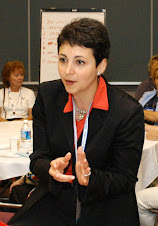In "life before consulting", I was the Director of Education and Training for United Jewish Communities Mandel Center for Leadership Excellence. (UJC is the umbrella organization for 155 Jewish Federations and 400 affiliated communities.) Because our department focused on developing skills, career paths, and learning experiences for professional staff as well as volunteers, we were participants in and facilitators of many, many conversations about supervision -- what skills new supervisors need to successfully transition to their new roles, how good supervision helps professionals to grow in their roles, the importance of training, mentoring and coaching for supervisors, and of course, how poor supervision can quickly turn a dedicated Jewish communal professional into an active job-seeker.
I was one of the lucky ones. My supervisor, Debbi, knew exactly when to offer support and when to offer direction, made herself available to discuss problems while still expecting me to bring her solutions, allowed me the freedom to take professional risks, and demonstrated genuine interest in me as a person. We had the kind of supervisory relationship that I know was the envy of many -- and it was the envy of many because so many were lacking what I -- we -- had.
Debbi and I often reflected on the old adage, "people don't leave bad jobs -- they leave bad supervisors." We had seen it happen so frequently within the Jewish communal world that it appeared to be an epidemic. And every time another instance occurred, she and I shook our heads, and drew closer, not unlike a married couple who bonds together against the news of a another couple's divorce.
Until it was time for me to leave. How on earth would I be able to communicate to Debbi that this was one of the exceptions -- I was not leaving a bad supervisor, and in fact, my relationship with her was one of the reasons I stayed as long as I did...
I probably cannot remember everything I said in that tearful conversation, but I do know it was like Dorothy telling Scarecrow as she was leaving Oz that she would miss him most of all.
And true to form, Debbi knew just how to support me, professionally and personally.
More than 4 years later, I am still in frequent contact with Debbi, and I consider her to be a member of my Personal Board of Directors. And as I travel around the North American Jewish community training and coaching supervisors in Federations, schools, agencies, and other organizations, I feel blessed to have such a wonderful example to take with me as a rare, real-life case study of what supervision can and should be.
Who is your model of an effective supervisor? For whom are you that model? What more do you need from yours? What more can you offer?
Deborah
www.jewishorganizations.blogspot.com
www.myjewishcoach.com
Subscribe to:
Post Comments (Atom)


No comments:
Post a Comment